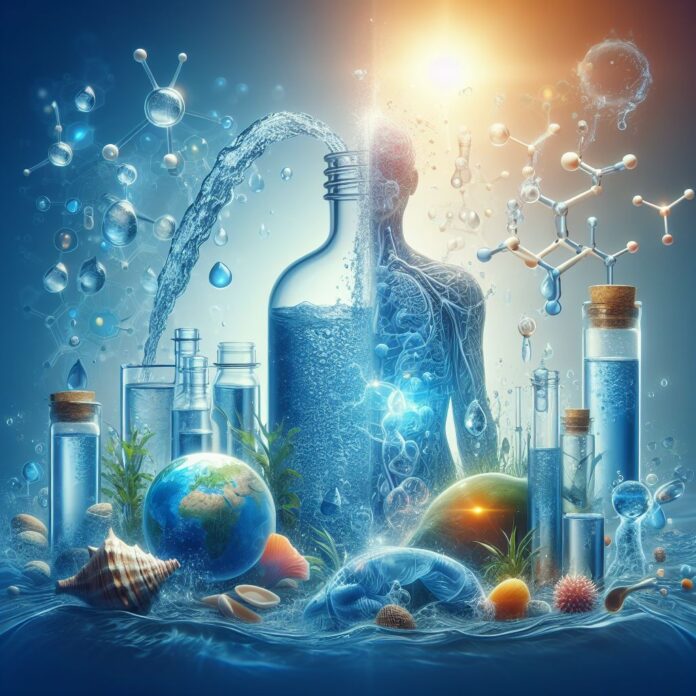Water: the quintessential element of life. It shapes our planet, sustains ecosystems, and forms the very foundation of human existence. Yet, in the hustle and bustle of daily life, the vital role of water in our bodies often goes unnoticed.
This article dives into the depths of our biological seas, exploring how water, the elixir of life, orchestrates a symphony of functions within us. From the rivers of blood that flow through our veins to the oceans of thought in our brains, water is the invisible conductor of life’s orchestra. As we embark on this journey, we’ll uncover the hydration equation that keeps us alive, the metabolic magic water performs, and its pivotal role in cognitive function, physical performance, skin health, weight management, detoxification, and immune function. So, grab a glass of water, and let’s explore the essence of our being.
I. The Hydration Equation in Our Bodies: The Lifeforce of Water:
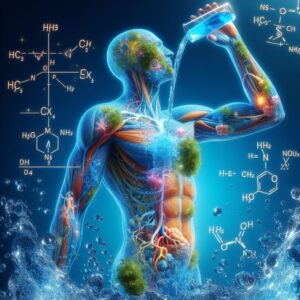
Water’s omnipresence in our body underscores its importance to our health. Each organ’s performance is tied to its water content, dictating not only its functionality but also its efficiency.
Here’s how the water within us works tirelessly to sustain life:
1. Blood: The River of Life:
Comprising 85% water, blood is the body’s internal river system. It transports oxygen to the cells and carries away carbon dioxide. It delivers nutrients absorbed from our food and sweeps away metabolic waste. To maintain this delicate balance, staying hydrated is vital. When dehydrated, blood volume can drop, leading to hypertension and increased heart rate. Drinking plenty of water supports blood volume and pressure, promoting cardiovascular health.
2. Lungs: The Breath of Moisture:
At 90% water, the lungs depend on hydration to keep the airways clear and moist. This hydration allows for the efficient exchange of oxygen and carbon dioxide. It’s the moisture in our breath that facilitates this exchange. To help your lungs function optimally, ensure consistent water intake, especially in dry environments or when exercising.
3. Brain: The Fountain of Thought.
The brain, 75% water, relies on this fluid for the production of neurotransmitters and hormones. Dehydration can lead to brain fog, fatigue, and slower response times. Keep your cognitive functions sharp by sipping water throughout the day, which can help maintain focus and clarity of thought.
4. Skin: The Canvas of Hydration.
As our protective barrier, skin at 80% water needs hydration to stay flexible and resilient. Hydrated skin is less prone to wrinkles, dry patches, and irritations. To keep your skin hydrated, drinking water is key, but so is protecting it from the dehydrating effects of excessive sun exposure and harsh soaps.
5. Bones: The Subtle Reservoir.
Though they seem solid, bones have a 25% water composition. This water is essential for the production of synovial fluid, which lubricates joints and cushions bones. Ensure your bones and joints are well-supported by maintaining proper hydration, which can help reduce the risk of joint disorders.
6. Muscles: The Power of Fluidity.
Muscles are 75% water, which is vital for muscle function. Proper hydration ensures that the electrolytes needed for muscle contractions are balanced, helping to prevent muscle fatigue and cramps. For athletes and fitness enthusiasts, drinking water before, during, and after exercise is crucial for peak muscle performance.
7. Maximizing Hydration for Health:
To ensure you’re adequately hydrated, start your day with a glass of water and keep a water bottle handy at all times. If you’re active, increase your intake, and remember that foods like fruits and vegetables also contribute to your daily water intake. Listen to your body’s thirst signals, and remember that by the time you feel thirsty, you’re already dehydrated.
Incorporating these insights into your daily life can vastly improve your overall health. The key is consistency and awareness—by regularly providing your body with the water it needs, you enable it to perform at its best, ensuring a healthier, more vibrant life.
II. Absorption and Energy Conversion:
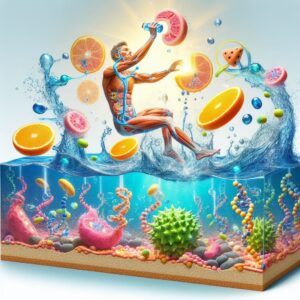
When delving deeper into the roles of water in absorption and energy conversion, we uncover how it serves as a cornerstone of our metabolic processes.
1. Unlocking Nutrients for Vitality:
Water acts as the medium through which soluble vitamins, minerals, and other nutrients can be absorbed into the bloodstream from the intestinal tract. For instance, water-soluble vitamins like Vitamin C and all B vitamins dissolve in water, enabling their transport throughout the body. Without adequate hydration, these nutrients cannot be utilized effectively, potentially leading to deficiencies despite a well-balanced diet.
2. A Catalyst for Metabolic Reactions:
Beyond nutrient absorption, water is integral to the biochemical conversion of food into energy. Enzymatic reactions responsible for breaking down carbohydrates, proteins, and fats into usable energy require a hydrated environment. Think of it as the difference between trying to cook in a dry pot versus a water-filled one. Dehydration can slow down metabolism, similar to how food sticks to the bottom of a dry pot.
3. Hydration for Digestive Health:
Water also ensures that the digestive system functions smoothly. It helps to form the mucus barrier in the stomach, protecting delicate gastric linings from the harsh environment needed to break down food. In the intestines, water keeps the contents moving, preventing constipation and aiding in regular waste elimination.
4. Tips for Optimizing Hydration for Metabolism:
– Start the Day Right: Begin with a glass of water to jumpstart your digestive system.
– Eat Water-Rich Foods: Incorporate fruits and vegetables with high water content into your meals.
– Mind Your Beverages: Opt for water or herbal teas over sugary drinks that can interfere with hydration.
– Hydrate for Exercise: Fuel your energy conversion processes by hydrating before, during, and after workouts.
By ensuring you’re well-hydrated, you’re not just quenching your thirst—you’re optimizing your body’s ability to harness energy from the foods you eat and supporting your overall digestive health. This is vital for anyone looking to maintain an active lifestyle, manage weight, or simply improve their overall well-being.
III. Cognitive Function and Water:
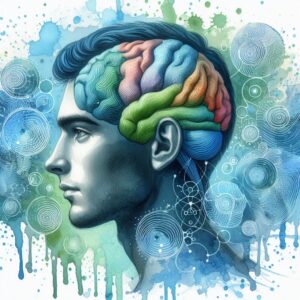
Diving into the relationship between hydration and cognitive function offers a fascinating glimpse into how water is pivotal for our mental prowess.
1. The Brain’s Thirst for Peak Performance:
Water is the brain’s elixir. As a conductor of electrical energy that enables all brain functions, from thought to memory to emotion, it requires a delicate balance of water to function optimally. Neurons and brain cells are highly sensitive to the body’s hydration levels. Even minor dehydration can lead to the shrinking of brain tissue, temporarily affecting cell function and hence, cognitive performance.
2. Memory, Mood, and Focus: A Triad Influenced by Hydration.
Studies have shown that dehydration can impair short-term memory, the recall of long-term memory, and the ability to perform complex tasks. Water scarcity in the brain can affect your mood, leading to feelings of anxiety or depression. Hydration also affects concentration and the ability to maintain focus on tasks, which is particularly important in learning environments or in work that demands sustained attention.
3. Strategies to Hydrate for Mental Clarity:
– Regular Intake: Drink water at regular intervals throughout the day, not just when you feel thirsty.
– Monitor Hydration Levels: Pay attention to the color of your urine – clear or pale yellow indicates good hydration.
– Mindful Morning Routine: Incorporate a glass of water into your morning routine to replenish any fluids lost during sleep.
– Hydrate for Brain Health: Keep in mind that beverages containing caffeine or alcohol can dehydrate, so balance these with water intake.
4. The Role of Water in Stress Response:
Furthermore, water plays a role in the body’s stress response system. Proper hydration can influence cortisol levels, one of the body’s stress hormones, helping to moderate the stress response and promote a sense of calm.
By providing tips on how to stay adequately hydrated, the content becomes actionable and user-centric, which enhances engagement. Moreover, addressing the subject of hydration from the standpoint of mental performance and health caters to a wide audience, from students to professionals to the elderly, widening the potential reach of your content.
IV. Physical Performance and Hydration:

The link between physical performance and hydration is a crucial topic for anyone invested in an active lifestyle or interested in fitness.
1. Hydration: The Athlete’s Fuel.
For athletes, water is more than a thirst quencher—it’s a performance enhancer. Optimal hydration is essential for maintaining endurance and power. During physical activity, the body loses water through sweat, which not only cools the body but also carries away metabolic waste. If this lost water isn’t replaced, the result can be a significant decrease in performance due to a drop in blood volume, increased heart rate, and overheating.
2. Preventing Dehydration-Related Setbacks:
The risks of dehydration are not to be taken lightly. A lack of water can result in serious performance deficits. This includes a reduction in muscular strength and high-speed endurance, making fast, forceful movements more difficult. In addition, dehydration can dull mental edge, leading to poor decision-making and reduced concentration. Staying well-hydrated is critical to prevent these negative impacts.
3. Tips for Hydration in Active Individuals:
– Before Exercise: Pre-hydrating with water can help prepare the body for the upcoming physical stress.
– During Exercise: Regularly consume small amounts of water to replace fluids lost through sweat.
– After Exercise: Rehydrate to restore fluid balance, including electrolytes like sodium and potassium.
– Listen to Your Body: Thirst is a late sign of dehydration; drink before you feel thirsty, particularly if you’re exercising in hot or humid conditions.
4. Hydration for Recovery:
The role of water extends into post-workout recovery. Adequate fluid replacement helps with the muscle repair process and can prevent delayed onset muscle soreness. By assisting in the transport of nutrients to the muscles, water facilitates the recovery process, allowing for a quicker return to training.
V. Hydrating for Healthy Skin:

The connection between hydration and skin health is a topic of interest for many, given the universal desire for a clear, vibrant complexion.
1. Water: The Skin’s Natural Moisturizer.
Hydration plays a crucial role in maintaining the skin’s natural barrier function and elasticity. When the skin is well-hydrated, it appears more plump and radiant. Adequate water intake helps to flush out toxins that can lead to inflammation and blemishes. It also aids in delivering essential nutrients to the skin cells, promoting a healthy glow.
2. Combatting Dryness and Aging:
Dehydration can exacerbate skin dryness, leading to a rough, flaky texture. It can also accentuate fine lines and wrinkles, making the skin look older than it is. By maintaining proper hydration levels, you can help keep your skin looking youthful and supple.
3. Tips for Hydrating Your Skin:
– Drink Plenty of Water: Aim for at least 8 glasses a day, and more if you’re active or live in a dry climate.
– Eat Water-Rich Foods: Incorporate fruits and vegetables with high water content, like cucumbers, tomatoes, and watermelon, into your diet.
– Use Hydrating Skincare Products: Look for products with hyaluronic acid, glycerin, or aloe vera, which help draw moisture into the skin.
– Avoid Dehydrating Factors: Limit exposure to hot showers, harsh soaps, and alcohol, which can strip the skin of its natural oils.
4. Hydration and Skin Conditions:
For those with skin conditions like eczema or psoriasis, staying hydrated can be particularly beneficial. These conditions often result in a compromised skin barrier, leading to increased moisture loss. By drinking enough water, you can support your skin’s natural barrier function and alleviate some of the discomfort associated with these conditions.
VI. Water and Weight Management:
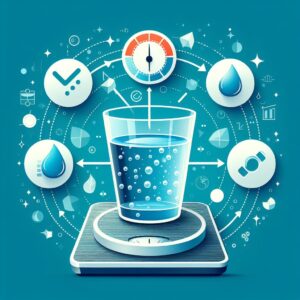
The relationship between water consumption and weight management is a topic that resonates with many people looking to maintain a healthy lifestyle.
1. Hydration: A Key to Weight Control:
Water can be a powerful ally in the battle against the bulge. It’s calorie-free, helps to fill you up, and keeps your metabolism running smoothly. By ensuring that you’re adequately hydrated, you can support your body’s natural weight management processes.
2. Boosting Metabolism and Reducing Appetite:
Drinking water can increase your metabolic rate, meaning you’ll burn more calories even when at rest. This is known as the thermogenic effect of water. Additionally, having a glass of water before meals can create a sense of fullness, reducing the likelihood of overeating. It’s a simple yet effective strategy for portion control.
3. Tips for Using Water to Manage Weight:
– Start Your Day with Water: Begin your morning with a glass of water to kickstart your metabolism.
– Hydrate Before Meals: Drink a glass of water about 30 minutes before eating to help control your appetite.
– Replace Caloric Drinks: Swap out sugary beverages for water to reduce calorie intake.
– Keep a Water Bottle Handy: Having water within reach throughout the day will remind you to stay hydrated and can help curb impulsive snacking.
4. Staying Hydrated for Optimal Digestion:
Proper hydration is essential for the digestive system to function correctly. Water helps to break down food, allowing your body to absorb nutrients more efficiently. It also aids in preventing constipation, which can be a barrier to a healthy weight.
VII. The Role of Water in Detoxification:
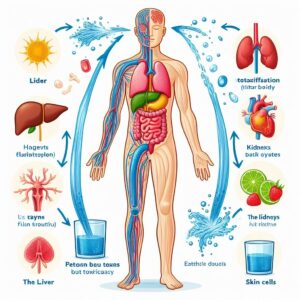
The role of water in the body’s natural detoxification processes is a topic of interest for many who are looking to support their health and wellness.
1. Water: The Body’s Cleansing Agent.
Water is essential for the body’s ability to remove waste and toxins. The kidneys, which are the primary organs responsible for filtering the blood and excreting waste, rely on a sufficient water supply to perform their function effectively. When we’re adequately hydrated, our kidneys can efficiently process and eliminate toxins through urine.
2. Supporting Liver Function:
The liver is another vital organ in the detoxification process. It works to metabolize and neutralize harmful substances so they can be safely excreted. Adequate hydration aids in maintaining optimal liver function, ensuring that the body can effectively process and eliminate toxins.
3. Tips for Enhancing Detoxification with Hydration:
– Drink Enough Water: Aim for at least 8 glasses a day, or more based on your activity level and climate.
– Include Hydrating Foods: Incorporate fruits and vegetables with high water content into your diet to boost hydration.
– Limit Dehydrating Substances: Reduce intake of caffeine and alcohol, which can dehydrate the body and burden the detoxification organs.
– Stay Active: Regular exercise encourages circulation and sweating, which can help in the elimination of toxins.
4. Hydration and Urinary Tract Health:
Proper hydration is also crucial for maintaining a healthy urinary tract. Drinking enough water helps to dilute urine, reducing the risk of urinary tract infections and kidney stones. It also ensures that urine flows regularly, preventing bacteria from accumulating in the urinary tract.
VIII. Hydration and Immune Function:
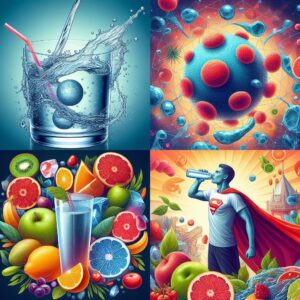
The link between hydration and immune function is an important aspect of overall health and wellness.
1. Hydration: Fuel for the Immune System.
Water is crucial for the proper functioning of the immune system. It transports oxygen and essential nutrients to immune cells, enabling them to function effectively. When the body is well-hydrated, these cells are better equipped to detect and combat pathogens, reducing the risk of infections and illnesses.
2. Supporting Lymphatic System Function:
The lymphatic system, a key component of the immune system, relies on hydration to transport lymph, a fluid containing infection-fighting white blood cells, throughout the body. Adequate hydration ensures that the lymphatic system can efficiently remove toxins and waste products, further supporting immune function.
3. Tips for Boosting Immune Function through Hydration:
– Maintain Consistent Hydration: Drink water regularly throughout the day to support immune health.
– Incorporate Immune-Supporting Hydration: Herbal teas and broths can provide hydration while also supplying immune-boosting nutrients.
– Monitor Hydration Levels: Pay attention to signs of dehydration, such as dark urine or dry mouth, and increase water intake accordingly.
– Balance Electrolytes: During illness or after intense exercise, consider drinks with electrolytes to maintain hydration and support immune function.
4. Hydration and Mucosal Barriers:
Mucosal barriers, such as those in the respiratory and digestive tracts, are the body’s first line of defense against pathogens. Adequate hydration helps maintain the integrity of these barriers, preventing the entry of harmful microorganisms.
IX. Stay Hydrated, Stay Healthy:
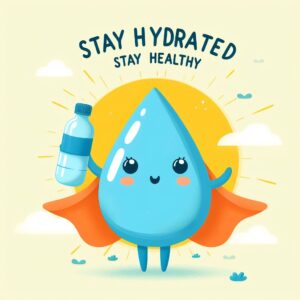
Incorporating the importance of hydration into a healthy lifestyle is crucial for overall well-being. Here’s how you can conclude your article with practical advice for your readers:
Stay Hydrated, Stay Healthy!
Water is not just a basic necessity; it’s the foundation of good health. Recognizing the importance of staying hydrated is the first step towards a healthier, more vibrant life. Here are some tips to help you maintain optimal hydration levels:
1. Practical Tips for Daily Hydration:
– Start Your Day Right: Begin each morning with a glass of water to replenish fluids lost during sleep.
– Set Hydration Goals: Aim for at least 8-10 glasses of water a day, adjusting based on your activity level and climate.
– Use a Water Bottle: Keep a reusable water bottle with you throughout the day to remind you to drink water regularly.
– Flavor Your Water: If plain water doesn’t appeal to you, add a slice of lemon, cucumber, or a few berries to infuse some flavor.
– Eat Water-Rich Foods: Incorporate fruits and vegetables like watermelon, cucumber, and spinach into your diet to boost your water intake.
– Hydrate Before, During, and After Exercise: Ensure you drink water before, during, and after physical activity to replace lost fluids.
2. Recognizing the Signs of Dehydration:
Being aware of the signs of dehydration can help you take action before it affects your health.Symptoms include:
– Thirst
– Dry mouth and lips
– Dark yellow urine
– Fatigue
– Dizziness
– Headache
3. Understanding Individual Hydration Needs:
Hydration needs can vary based on factors such as age, weight, activity level, and climate. Pay attention to your body’s signals and adjust your water intake accordingly. If you have specific health conditions or dietary requirements, consult with a healthcare professional to determine your optimal hydration level.
Water is a vital element of life that supports every cell, organ, and system in your body. By making hydration a priority, you can enhance your health, boost your energy levels, and improve your overall quality of life. Remember, when it comes to health and wellness, every sip counts!
Conclusion:
In the grand tapestry of life, water emerges not just as a thread but as the very warp and weft that holds it all together. Our exploration has revealed the multifaceted roles water plays in our bodies, from the cellular level to the systemic, from the physical to the mental. Staying hydrated is not merely about quenching thirst; it’s about nourishing every part of our being. As we go about our lives, let us remember to honor this precious resource, listen to our body’s subtle cues for hydration, and integrate water into our daily rituals. In doing so, we do more than just survive; we thrive. Water is the essence of life, the key to vitality, and the source of health. Let it flow through you, replenish you, and elevate you. Stay hydrated, stay healthy, and let the waters of life carry you to the shores of well-being.
Written by S.Boullay

